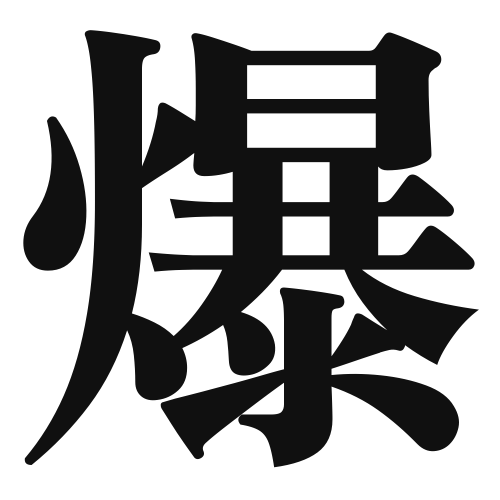1. Overview of Meaning
The kanji “爆” (baku) means “explosion” or “blast.” It conveys the idea of something bursting or erupting, often associated with loud sounds and sudden releases of energy.
2. Formation and Radical
Formation of the Kanji: The kanji “爆” is a phonetic-ideographic character (形声文字). It combines the radical for “fire” (火) with a phonetic component that suggests the sound of an explosion.
Radical: The radical of “爆” is 火 (hi), which relates to fire and heat, emphasizing the explosive nature of the word.
3. Examples of Usage
Common Words and Phrases: Some frequently used words that include “爆” are:
- 爆弾 (ばくだん, bakudan) – bomb
- 爆発 (ばくはつ, bakuhatsu) – explosion
- 爆笑 (ばくしょう, bakushou) – burst of laughter
Example Sentences in Daily Conversation:
- その映画は爆発シーンがすごかった! (そのえいがはばくはつシーンがすごかった!) – That movie had an amazing explosion scene!
- 彼のジョークはいつも爆笑を引き起こす。 (かれのジョークはいつもばくしょうをひきおこす。) – His jokes always cause a burst of laughter.
4. Synonyms and Antonyms
Similar Kanji: A similar kanji is “轟” (ごう, gou), which means “roar” or “rumble.” While both convey loud sounds, “轟” focuses more on continuous noise rather than a sudden explosion.
Antonyms: An antonym of “爆” could be “静” (しず, shizu), meaning “quiet” or “calm,” representing the absence of noise and disturbance.
5. Cultural and Historical Background
Relation to Japanese Culture: The concept of “爆” is often found in Japanese media, especially in action films and anime, where explosions are a common theme.
Proverbs and Idioms: One idiom that includes “爆” is “爆笑する” (ばくしょうする, bakushou suru), which means “to burst into laughter,” highlighting the explosive nature of laughter in a humorous context.
